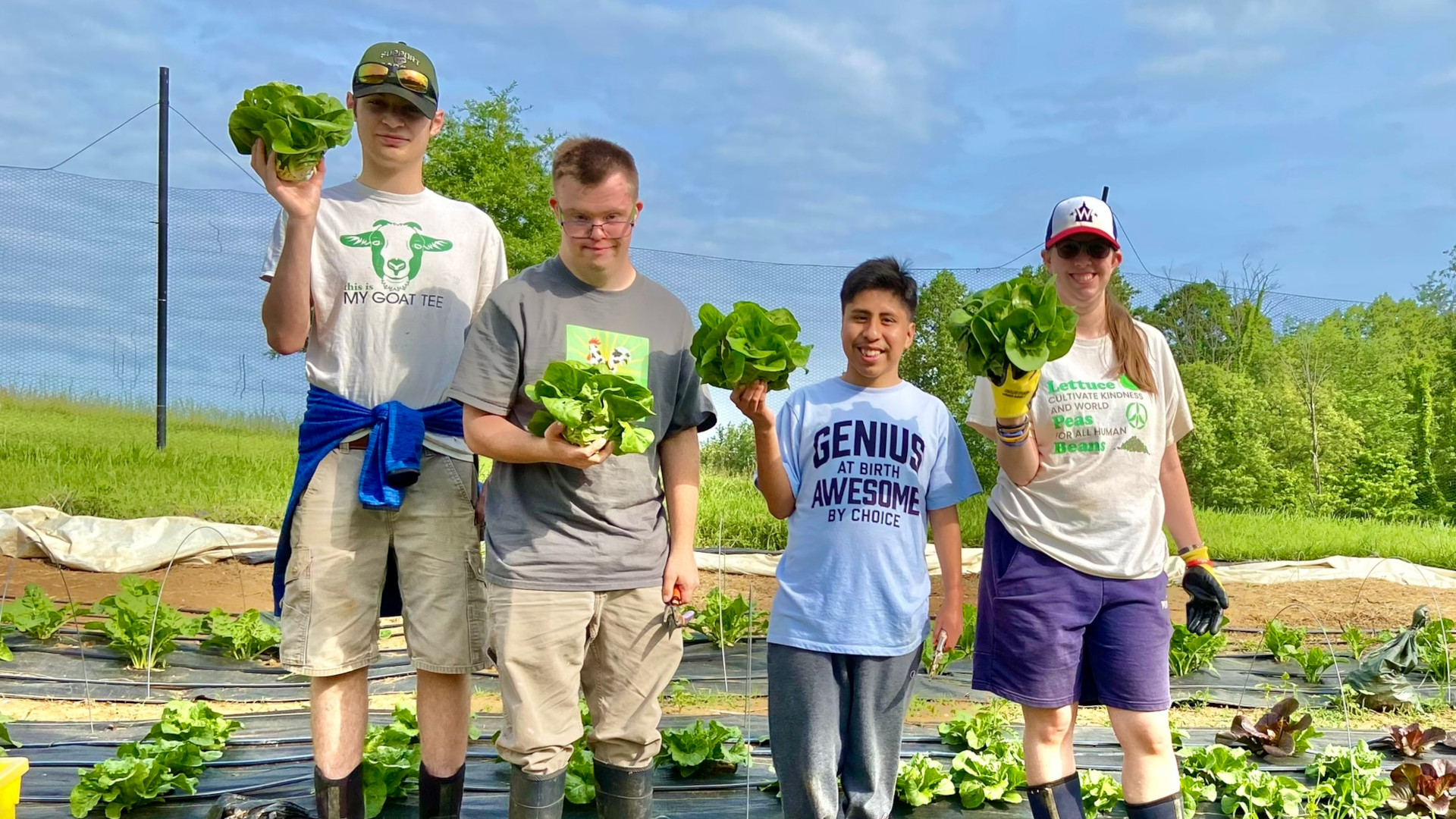Sol Systems (Sol) is proud to partner with A Farm Less Ordinary (AFLO) through our Sol Profit Share initiative. This program allows solar energy system owners participating in Sol Systems’ Solar Renewable Energy Certificates (“SREC”) aggregation solutions, including homeowners, businesses, and institutions, to choose a Sol Profit Share contract. With this contract, customers receive a guaranteed fixed payment per SREC, and they also share additional profits when SREC prices increase. Additionally, Sol donates 5% of the net Sol Profit Share to non-profit organizations that support renewable energy access and sustainability efforts.
With the 2023 proceeds from the Sol Profit Share initiative, Sol is supporting AFLO’s work in the Washington, DC area, where they provide opportunities for people with intellectual and developmental disabilities (ID/DD) through community-supported agriculture.
A Personal Story Turned Mission
AFLO was founded in 2016 by Greg Masucci and Maya Wechsler, inspired by their experience raising their son, Max. Max, who is nonverbal and autistic, motivated Greg and Maya to envision a future where individuals like him could lead fulfilling, independent lives beyond the age of 22, when school services typically end. In search of a safer, happier environment for Max and his siblings, the family moved from Washington, DC to Bluemont, VA, in 2014.
AFLO was born out of their desire to provide meaningful work and a sense of community for people with ID/DD. Today, the farm offers employment opportunities that help bridge the gaps in services and opportunities that individuals with ID/DD often face.
The Challenge for Individuals with ID/DD
In the United States, individuals with ID/DD face numerous challenges once they age out of educational and support services at 22. Employment opportunities are scarce, and many face barriers related to transportation and housing. In Loudoun County, VA, for instance, only 37.3% of residents with cognitive disabilities aged 18-64 are employed (2019).
Historically, people with disabilities lacked basic protections under U.S. law. While the Civil Rights Act of 1964 did not offer protection for individuals with disabilities, the enactment of Section 504 of the Rehabilitation Act in 1973, and later the passage of the Americans with Disabilities Act (ADA) in 1990, began to address these inequities. The lack of employment opportunities and support services can lead to social isolation and negatively impact mental and physical health. Despite these protections, challenges remain, and AFLO is working to help fill the gap.
Empowering Through Farming
From its humble beginnings, AFLO has grown into a two-location farm using organic growing methodologies and no chemical pesticides. They offer both employment and empowerment for its staff of "Growers"—local adolescents and adults with ID/DD who are the heart of AFLO’s mission. These Growers gain practical job skills, such as seeding, transplanting, and harvesting, while also developing social skills and physical coordination through tasks like weeding and planting, supporting a booth at markets, and sales. Evidence increasingly supports this concept known as "Green Care”, which suggests that working in nature improves health and mental well-being.
Community Impact and a commitment to growth
AFLO’s impact goes beyond the farm, benefiting the broader community. Growers contribute to local food security through its Community Supported Agriculture program, farmers markets, and donating thousands of pounds of food to local area food banks. Growers also take pride in bringing home a weekly share of the fruits of their labor, which provides healthy food and a tangible reminder of the rewards that reinforce their value and hard work. While a significant portion of AFLO's funding comes from donations and grants, their sales model directs at least 25 cents2 of every dollar generated back to the Growers’ paychecks, further underscoring their role as primary beneficiaries. By the end of 2024, AFLO could give 31 cents of every sales dollar directly to the Growers.
In addition to feeding, socializing, and educating their community, AFLO embraces a variety of organic and sustainable practices, uniquely situating themselves at the intersection of inclusion and sustainability. They plant cover crops, use rotational gardening, and practice polyculture by growing produce alongside herbs and flowers to attract beneficial insects. AFLO has blossomed by experimenting with and creating value-added products such as pickles, cut flowers, and an array of jams and jellies, fostering new kitchen and food safety skills and enabling year-round production and employment. These efforts generate a multiplier effect, extending the positive benefits of the farm’s work throughout the community.
With support from the 2023 Sol Profit Share funding, AFLO plans to expand their winter growing program, allowing more greenhouse gardening and increasing the available work hours and number of Growers on site. For many of the Growers, their work at AFLO is their primary source of socialization, income, and physical activity, making the farm’s growth even more impactful.
Building a More Inclusive Future
Sol is committed to supporting organizations like AFLO that create economic and social opportunities for their communities. By choosing the Sol Profit Share contract, customers have helped make this partnership with AFLO possible, advancing Sol’s mission to enable community impact through infrastructure and local collaboration.
To learn more about how AFLO is driving sustainable farming and positive change throughout their community, please visit their website at: https://www.afarmlessordinary.org/.



